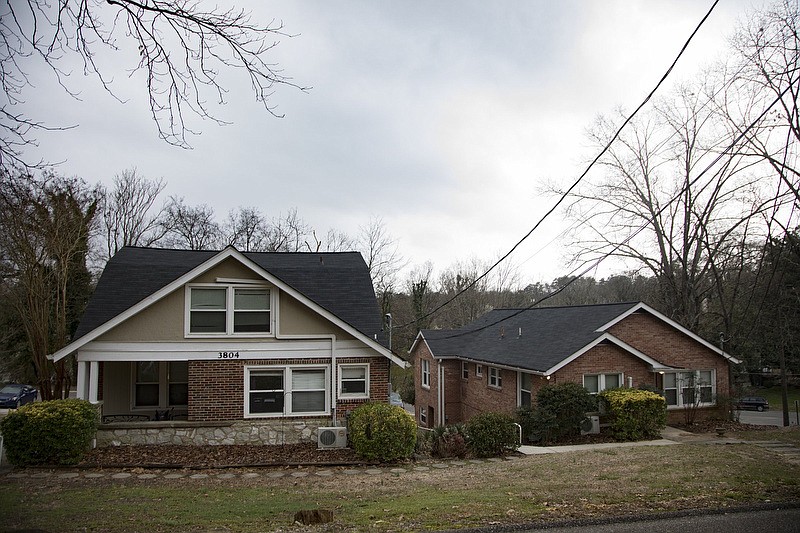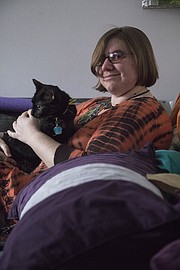Read part one of this series on low-income housing in Chattanooga here.
Kale Sartor, 30, lives just over two miles from the site of the proposed Espero Chattanooga housing development and the neighbors of the site who worry about bringing low-income housing and its clientele to the area.
Sartor has a modest, one-bedroom Brainerd apartment that she shares with her cat Sly, in an unassuming gray building on a road with a fair mix of both this kind of development and traditional single-family houses.
A tutor and a published writer, her living room is lined with books. She likes to read. She watches TV. She lives a home life not dissimilar to most people.
That is, now that she has a home.
Sartor is a resident of one of the AIM Center's 72 existing units in Chattanooga. The nonprofit organization provides low-income housing to those with mental health issues.
"I had no place to go because there are literally no other options," Sartor, who has been out of work due to physical and mental health challenges, said. "I had to stop working so I moved here to stay with friends. It was almost impossible to find housing that was not just affordable but available."
Sartor spent more than a year without a permanent residence, a time she doesn't like to talk about, scouring for a place to stay, despite being incapacitated by depression, anxiety, fibromyalgia and related health complications.
After about a year on the waiting list, she finally found refuge with AIM Center, through which she is able to rent her apartment, receive supportive social and career resources, and participates in a community.
"The AIM Center is great. Everybody I know involved with the center is disproportionately nice," she said. "That's what made it so hard to hear these people be so vicious about us."
A few days earlier, Sartor went to two East Chattanooga community meetings at which homeowners debated a 60-unit, low-income housing development to be operated by AIM Center. At this meeting, homeowners balked at the Main Street development, saying that bringing such housing and people to their neighborhood would "stifle" the area.
"The first thing is the building is out of context for the neighborhood, it's all single family," homeowner John Paque said. "And then what happens with the psychological effect of bringing 60 low-income, poverty stricken people in to the neighborhood - you are absolutely stifling the [neighborhood's] potential."
While Sartor had anticipated some version of these comments, she was floored by some of the more flippant comments at the meeting.
"I expected people to be ignorant and to come in with a perspective and to learn more about the project, but this was a lot rougher than I ever imagined," Sartor, who was there to advocate for the AIM Center, said after hearing people shout "who cares," and "that's their problem" about people in the very same situation she had been in.
"If that kind of attitude can really keep this many lives from being changed, there's something seriously wrong," Sartor said. "And they shouldn't even separate themselves from us because disability is the only marginalized group that you can be cast into in a minute - you could get hit by a truck, or have a mental episode tomorrow, and you would be in the same place."
In Chattanooga, 24% of homeowners and 40% of renters are housing cost burdoned, meaning they spend more than 30% of their gross annual income on housing, according to the Tennessee Housing Development Agency.
For Jim McClure, the AIM Center's chief financial officer, homeowners acting like his clientele are a foreign class to their neighborhood are living in denial of the city's housing epidemic and the realities of mental health issues.
"Go out on your front porch, look to your left and then look to your right," McClure said, frustrated by the response to the Main Street project. "Someone in one of those houses in your neighborhood right now is struggling with this same stuff. The difference is they have the resources to take care of it without this kind of help."
McClure prides himself and his group on providing services to roughly 80 people struggling with mental health issues every day.
Paramount to his efforts, McClure said, is being able to find housing for those in need.
"We prioritize housing first because you have to have a place to stay before you can be expected to get a job or work on your mental health," he said. "You can't be expected to work on that stuff when you're sleeping on the streets and can only worry about not getting beaten or robbed or where your next meal is coming from."
That's why AIM works with the city to create income restricted housing, like the development in question, which would allow those in need to get housing for 30% of their income with vouchers provided by the Chattanooga Housing Authority covering the difference.
"That way we can know and they can know they're in a safe place and they have somewhere to go," McClure said. "Then, they're just like any of your neighbors struggling with mental health, and we're here to make sure they get the support they need."
"And it's just wrong for people to act like [our tenants] deserve anything less than a place to live," McClure added.
One of the most stricken by the response to the development was the Chattanooga city councilman who represents both the development in question and the neighbors opposed to it.
Teary-eyed, the usually chipper District 8 Councilman Anthony Byrd reflected on the lack of "humanity" in the way some of his own constituents spoke of their less fortunate counterparts as he bounced from one public meeting to the next, reflecting on the words "who cares."
"It took me back to a time in our country that was really, really, really evil and bad when people had no empathy for someone's race or their sexuality," Byrd said of the negative commentary from some members of a neighborhood group about those in need of housing and mental health support. "You could hear the lack of compassion. It made me feel like I was in the 1940s or '50s when people didn't want to hear that African-Americans should have a chance - I can't think of another stereotype to compare it to. It felt like I was being called the N-word. It felt like it must have back in the old days when people were trying to help, but some people didn't want to see that progression."
As the only council member now facing opposition for his seat next year, he first hesitated to support the development out of fear of losing votes.
"Look, that one decision might make me lose my seat. I looked really hard and I asked my constituents to tell me why this was factually a bad thing, but there's nothing," Byrd said, having looked for examples of failed developments by Vecino Group or the AIM Center, who will co-own the property. "I might lose my seat, my job because of this decision, but I know 100% with my heart it's the right thing to do."
As the council member representing the area, Byrd hopes his support will solidify the city's intention to donate the property and greenlight the development.
"It's not easy to go with your heart against your voters who elected you to represent them, but I represent the voters who need a place to live, too," Byrd said. "It really is just a concern based on a lack of understanding or willingness to understand your neighbors, and I can't make decisions like that - I think and I hope my colleagues will vote with me on approving this project."
Going forward, Byrd said, he hopes that the fight for this development serves as a reminder of empathy and a deterrent from future stigma against Chattanoogans facing homelessness and mental health issues.
"I hope we can all learn from this and be better to our neighbors," he said. "Black, white, rich, poor, racist, whatever, we all need a seat at the table and we're all looking to come up with things everyone will eat."
The development is one of three projects in the final "innovation" round to receive low-income housing tax credit funding from the state. It will come before the city council for a vote on the property donation afterward, if funding and an ecological agreement are approved by the state.
Contact Sarah Grace Taylor at staylor@timesfreepress.com or 423-757-6416. Follow her on Twitter @sarahgtaylor.

